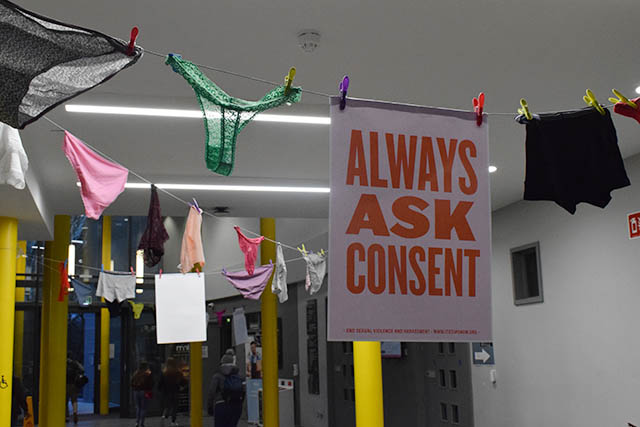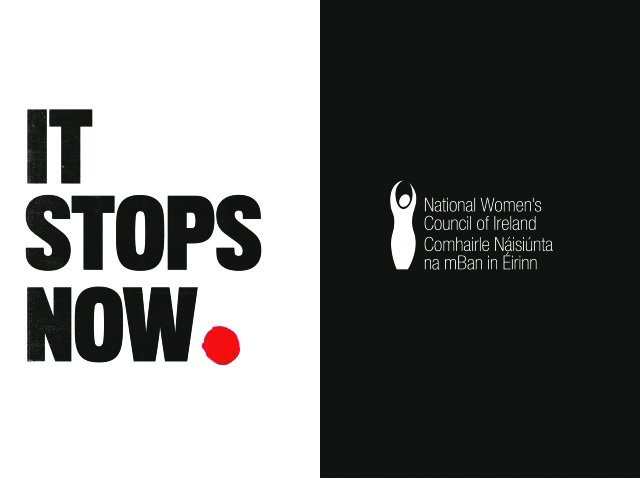
[dropcap]T[/dropcap]he Union of Students Ireland (USI) held a campaign to stop gender-based violence across universities in Ireland as part of the It Stops Now campaign, as such harassment often goes unreported and unnoticed.
It Stops Now is part of the Ending Sexual Harassment and Violence in Third-level Education (ESHTE) project, funded by the European Commission.
The project aims to prevent and combat sexual and physical violence as well as building a culture of zero tolerance in third-level institutes across Europe.
The World Health Organisation (WHO) estimated in 2014 that 1 in 3 women (35%) worldwide experienced either physical or sexual abuse in their lifetime.
In a report done by the European Commission in 2017, as part of the ESHTE project, it was noted that there is limited research available on gender-based violence in EU Higher Education Institutes (HEIs), however there is a growing acceptance and understanding that it is a significant problem.
The report explains that the frequency, scope and impact of such violence is underreported and under researched as “it is difficult to acquire information on the magnitude and consequences of violence against women as it often remains hidden.”
Jennifer McCarthy Flynn, ESHTE Project Coordinator, said that a “shockingly high number of women students are experiencing some form of sexual violence and harassment related to their lives in higher education.”
McCarthy explained that in Ireland, 11% of female students surveyed, were subjected to unwanted sexual assault, with a further 31% of females reported feeling harassed.
Despite the lack of data, McCarthy feels that naming the problem is a huge step in challenging violence against the gender and the scarcity of research, particularly among students who have suffered such violence.
The ESHTE project analyses the attitudes of the 28 member states of the European Union, in relation to violence against women.
In the UK & Ireland, 18% of participants agreed with the statement “Violence against women is often provoked by the victim.”
A further 27% of participants across the EU agreed that “having sexual intercourse without consent was justified” by; being on drugs or drunk, going home with someone voluntarily, wearing provocative clothes or not clearly saying no.
The 2015 National Sexual Assault Unit, a service given by the Health Service Executive (HSE) and Garda Siochana for people who have recently experienced sexual assault, recorded that 45% of people who attended for rape or sexual assault were students.
The USI are working with the National Women’s Council of Ireland (NCWI), a representative of women in Ireland whose mission is to empower females and remove inequalities.
Hayley Mulligan, the Violence Against Women officer at NCWI, recently told The College View that gender-based violence is, “any violence or harassment that is directed at someone based on their gender.”
This campaign was held by the USI to remind students of their shared responsibilty to develop a zero tolerance culture in order to end all sexual violence and harassment, both on and off campus, including victim shaming, cat calling and sexist jokes.
The USI emphasised that this harrassment is suffered across the board of genders.
This campaign is not the only thing Student Unions and universities in Ireland have been doing to combat violence against the gender.
Dublin City University (DCU) have held SMART CONSENT Workshops for students since 2018. These workshops are free of charge and help students gain a deeper understanding of what consent means.
Students are given different scenarios and asked if consent was present in each situation and why or why not.
Minister of State for Higher Education, Mary Mitchell, launched the Framework for Consent in Higher Education plan, which aims to create a culture of safe, respectful and supportive campuses across Ireland.
This consent plan means workshops, similar to those held in DCU, were implemented in most other universities and colleges in Ireland.
University College Dublin (UCD) have followed DCU and University College Cork (UCC) in implementing a bystander intervention course.
DCU first piloted the course in 2016, held over eight weeks with 45 participants, as part of the It Stops Now campaign.
In UCD, the course will be mandatory for all new students as part of their orientation, in September 2020.
Students will be educated on consent and encouraged to be more open to calling out sexual misconduct.
In a statement about the course, Dr Aideen Quilty, UCD Director of Gender Studies and the academic lead on the bystander course, said: “[We want to] equip students with the confidence to intervene in small ways in the event they do see something or experience it themselves.”
Along with this, UCD have created a new website, Report + Support, where students can report abuse anonymously. The website also provides students with direct links to Gardai, if they wish to take their report further.
In recent months, DCU’s Student Union set up a consent display in the student centre. The display consisted of various pieces of male and female underwear, accompanied with posters that stated ‘Always Ask Consent’.
This display was later destroyed. Videos of young men tearing down the display, captioned “Fuck DCU” circulated on social media. A separate photo of the same incident was also posted, with the caption “That’s only the start of it.”
The Student Union posted on Twitter, reacting to the vandalism. They Tweeted: “The level of disrespect and ignorance shown is exactly why things like this are so very necessary.”
Jack Stevens, the young man who uploaded the video, apologised on Twitter for his and the other men’s actions.
Stevens claimed that none of the people involved attended DCU, so they were not aware what the display was for; if they had known they would’ve never done it.
He went on to explain they never intended to hurt anyone and that “a lot of alcohol was consumed on our behalf.”
This display was put back up for a short period, following the vandalism.
Gender-based violence is a significant issue that is often suffered in silence. Universities across the EU will continue to combat it and educate students, in order to challenge this hidden problem.
Note: This article was reuploaded on 26/03/21 due to a fault with The College View website.
Emily Clarke
Image credit: Sonja Tutty



